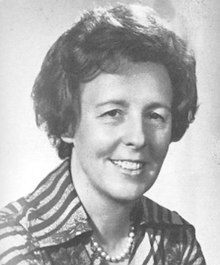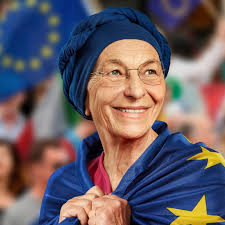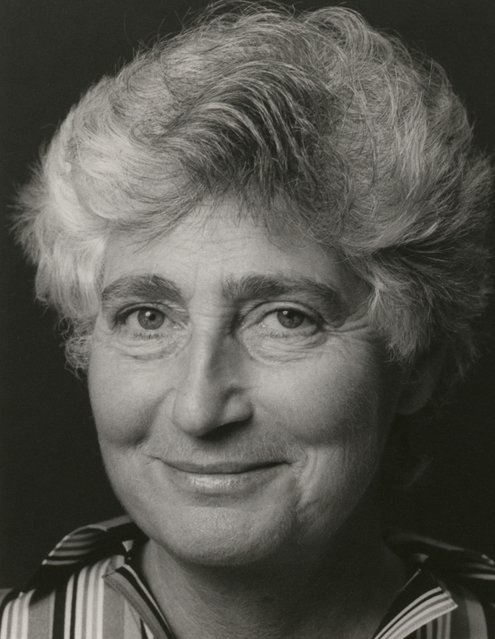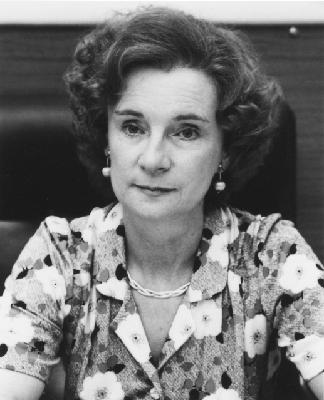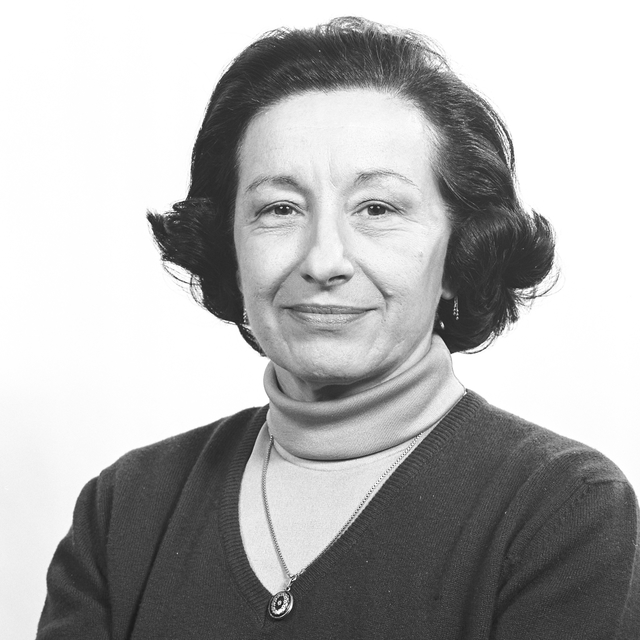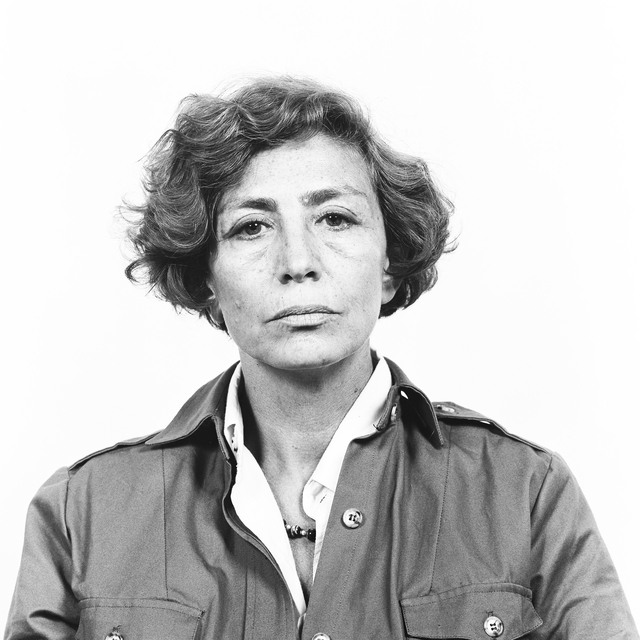Italy
Biographies of Members of European Parliament (women)
1979-1984
Italy had eighty-one members of the 1979 European elections of which eleven were women.
These women were:
Christian Democrats
Maria Luisa Cerretti Cassanmagnago (1929-2008), Deputy, Member of outgoing European parliament
Paola Gaiotti Debiase (1927-), Professor, writer
Radical Party
Emma Bonino (1948-), Deputy
Italian Republican Party
Susanna Agnelli (1922-2009), Deputy, Mayor of Monte Argentario (Tuscany)
Italian Communist Party
Maria Fabrizia Baduel Glorioso (1927-2017), President of the EEC Economic and Social Committee
Carla Barbarella (1940-) politician
Tulia Carettoni-Romagnoli (1918-2015), Independent Senator, former Vice President of the Senate, former member of European Parliament
Maria Luisa Cinciari Rodano (1921-), Former Vice president of the Chamber of Deputies, Provincial Councillor
Leonilde Iotti (1920-1999), Deputy, member of outgoing European Parliament
Vera Squarcialupil (1928-), Senator, member of outgoing European Parliament
Proletarian Democratic Unity Party
Luciana Castellina (1929), Deputy, journalist
MEP Biographies
Maria Luisa Cerretti Cassanmagnago
National deputy from 1972 to 1976 and from 1976 to 1979 and was elected in the 1979 European elections, reconfirmed in 1984 and 1989. Vice-president of the Commission for the verification of powers, of the Commission for development and the cooperation of the Delegation for relations with Canada , Committee on Foreign Affairs and Security; member of numerous commissions including the Women’s Rights Commission.
From 1979 to 1982 she was vice-president of the parliamentary group of the European People’s Party. After the dissolution of the DC, she joined the Italian Popular Party . She was a member of the federal assembly of the Margherita. Until her death she was President of the Lombard Initiative Committee for the European Federal State.
Paola Gaiotti Debiase
Paola Gaiotti De Biase, born on August 26, 1927 in Naples, is an Italian politician. A member of the Christian Democracy and the Left Democratic Party, she sat in the European Parliament from 1979 to 1984 and in the Chamber of Deputies from 1994 to 1996.
During her term as an MEP Paola Gaiotti De Biase sat on the Committee on Youth, Culture, Education, Information and Sport, Committee on the Rules of Procedure and Petitions, Committee of inquiry into the situation of women in Europe and Delegation for relations with Yugoslavia
Emma Bonino, Deputy
‘ . . for all those who believe that it is still possible to improve our world – and ultimately the human condition – every day.’
Emma Bonino, Italian Politician and Member of first European Parliament elected by direct universal suffrage in 1979
Emma Bonino OMRI, CdrLH, (born 9 March 1948) is an Italian politician, feminist, radical activist and former MEP. She currently is a Senator for Rome. She served as Minister of Foreign Affairs from 2013 to 2014. Previously, she was a Member of the European Parliament (MEP) and a member of the Senate of the Republic. She served in the government of Italy as minister of international trade from 2006 to 2008. She has served continuously as a politician either in the Italian system or as an MEP in the European parliament apart from when she was appointed between 1994 and 1999 as European Commissioner.
She is a leading member of the Italian Radicals, a political party which describes itself ‘liberale, liberista e libertario’ (where liberista denotes economic liberalism and libertario denotes a form of cultural liberalism concerning moral issues, with some ideological connection with historical left-libertarianism). She graduated in modern languages and literature from Bocconi University in Milan in 1972.
When Emma Bonino was 27 years old she had an illegal abortion and it was this action, the need to do something to ensure that women could access safe and legal abortions, that prompted her to enter politics becoming a member of the Radical party. She initially worked as a teacher of foreign languages until 1975 before going into politics full-time with a focus on defending the rights of individuals in a liberal society and promoting human rights and women’s issues including divorce, abortion and an end to gender based violence.
A veteran legislator in Italian politics and an activist for various reform policies, she was elected six times as deputy and two times as senator. She was the leader of More Europe, a liberal, European Federalist party.
Bonino was first elected to the Italian Chamber of Deputies in 1976 and re-elected in 1979, 1983, 1987, 1992, 1994 and 2006. In 1975, she founded the Information Centre on Sterilisation and Abortion and promoted the referendum which led to the legalisation of abortion in Italy. In 1986, she was among the promoters of a referendum against nuclear energy that led to the rejection of a civil nuclear energy programme in Italy.
On 17 May 2006, Bonino was appointed as minister for international trade in the cabinet of Romano Prodi. She resigned from office on 7 May 2008 when she had been elected vice president of the Senate the previous day. In 2008, at the elections of 13 and 14 April, she was elected to a seat in the Senate, the second parliamentary chamber, on the list of the Democratic Party. for the Piedmont constituency.
On 28 April 2013, she was sworn in as foreign minister in the government led by Enrico Letta. In June 2017, public opinion polls of her stood at 43 percent, second only to prime minister Paolo Gentiloni. Despite the positive public opinion, her party falls short of the 3 percent required for a seat in Parliament. In response, she has adopted the slogan ‘Love Me Less, Vote Me More’.
Bonino was elected in the constituency of Rome – Gianicolense district at the 2018 general election. Bonino was elected to the European Parliament in 1979 and re-elected in 1984 and 1999 and again from 1999 to 2006. She served as the Secretary of the Transnational Radical Party in 1993–94 and the party’s president in 1991–1993. In October 1994, she was appointed head of the Italian Government delegation to the UN General Assembly for the “Moratorium on death penalty” initiative. From 1994 to 1999, she was European Commissioner responsible for Consumer Policy, Fisheries and the European Community Humanitarian Office (ECHO). In 1997, her field of competence was widened to include consumer health protection and food safety.
‘To protect is part of being a human being’ – Emma Bonino
As European Commissioner for Humanitarian Aid, Emma Bonino was responsible for managing the European Union’s Emergency Aid Program (ECHO), which had an average budget in excess of 800 million Euro per year, of which almost one-third was channelled through United Nations agencies. Through these links she made strong connections with representatives of the United Nations and with those working in the humanitarian field.
From 1993 on, she led the campaign for the establishment of the International Criminal Tribunals for the former Yugoslavia and for Rwanda, and for the establishment of the International Criminal Court. While she was EU Commissioner for Humanitarian Affairs, Emma Bonino was the Head of the European Commission Delegation to the Rome Diplomatic Conference of Plenipotentiaries on the Establishment of an International Criminal Court in 1998, at which the Rome Statute was adopted.
On 15 March 1999, together with all the Santer Commission, she resigned due to the accusations of fraud and mismanagement against commissioner Édith Cresson. In November 2002, she was appointed Head of the Italian Government delegation at the Inter-governmental Conference of the Community of Democracies in Seoul. As European Commissioner, Emma Bonino confronted the major man-made crises of the 1990s, which resulted in millions of refugees and displaced persons, including in the Great Lakes Region and in the Balkans. Her frequent field-visits drew international attention to the crises in these regions, which she maintained required a political, and not just a humanitarian, response. In particular, her alarm call on the massacres being perpetrated in Srebrenica, and then the deportations in Kosovo, awakened the world’s attention. In December 1997, as one of the promoters of the campaign, she signed on behalf of the European Commission, the Ottawa Anti-Personnel Mines Convention.
Along with Marco Pannella, another member of the Radical Party, Bonino has fought numerous battles for civil rights and individual liberty, mainly concerned with divorce, the legalisation of abortion, the legalisation of drugs, and for sexual and religious freedoms. She has fought for an end to capital punishment, against female genital mutilation, and the eradication of world hunger. In 1975, Bonino funded the information centre for abortion (CISA), and in 1997 she supported the international movement condemning the discrimination of females in Afghanistan, ‘Un Fiore per le Donne di Kabul’ (A Flower for the Women of Kabul). Bonino is also a champion of the recognition of women’s rights in the countries of the African Union through the Maputo protocol. She is a founder of the nongovernmental organizations ‘Non c’è Pace senza Giustizia’ (No Peace Without Justice), which supports the international protection and promotion of human rights and democracy founded in 1993, and ‘Nessuno Tocchi Caino’ (Hands Off Cain), which is an international league that fights for the abolition of the death penalty.
In June 1999, she obtained a historic percentage of votes (8.5%) in the European elections (vs. the usual 2–3% that Radicals got in the previous and subsequent elections). Her list (Lista Bonino) won seven of 78 Italian seats in this election.
Emma Bonino supported the NATO intervention in Kosovo in the spring of 1999. From 1999 to 2004, the Lista Bonino was non-affiliated, as it was founded with a claim to not adhere to the traditional centre-left versus centre-right politics, rather remaining in the middle to maximize any potential bargaining power. In the case “Emma Bonino and Others v Parliament and Council (Case T-40/04)”, the Liste Emma Bonino contested before the Court of Justice of the European Union that its exclusion from Community funding due to not qualifying as a party on the ‘European level’ was discriminatory. The court dismissed this argument as inadmissible, establishing that measures do not necessarily need to legally affect an applicant in order for the case to directly affect them. Since 2004, it is part of the ALDE group.
In 2002, Bonino in cooperation with the Associazione Italiana Donne per lo Sviluppo (AIDOS, Italian Association for the Development of Women), called an Italian Parliament meeting to discuss the ending of female genital mutilation. Bonino led the ceremonies, which gathered medical experts, ambassadors, and politicians to review graphic information about the practice of female genital mutilation in African countries. During this meeting, Bonino recounted her travels through Somalia, Egypt, Tanzania, The Gambia, and Ethiopia, where she learned about these rural practices by meeting women who participated in projects to stop them. Many African women who suffered from genital mutilation discussed there first-hand experiences. At the conclusion of the meeting, the Prime Minister Berlusconi congratulated Bonino on her accomplishments in this cause and presented the leader of AIDOS with a check for the European Campaign.
In December 2001, she moved to Cairo with the objective of learning the Arabic language and culture. Her time in Egypt has focused her expertise in human rights and humanitarian issues in the Middle East and North Africa. In March 2003, she started a daily review of the Arabic press on Radical Radio.
As part of her work in the region, in January 2004, she headed the political process that led to the Sana’a Inter-Governmental Regional Conference on Democracy, Human Rights and the Role of the International Penal Court (IPC), organised by the Government of Yemen and the NGO No Peace Without Justice. The Sana’a Conference was a critical part of an ongoing awakening of democratic aspirations in the Middle East and North Africa, recognising that democracy is not just representative institutions, but respect for fundamental principles, particularly the rule of law and human rights. She is currently a board member of the Arab Democracy Foundation. Bonino was a board member of DARA until December 2012 (DARA is a non-profit organisation established by Silvia Hidalgo in Spain to assess the impact of humanitarian aid and to make recommendations for changes in policies and practices). In 2016, she was appointed by Erik Solheim, the Chairman of the Development Assistant Committee to serve on the High Level Panel on the Future of the Development Assistance Committee under the leadership of Mary Robinson.
Bonino writes opinion editorials and commentaries for both the Inter Press Service News Agency and Project Syndicate, discussing contemporary international issues including Syrian refugees affecting Europe, abolishing the death penalty, relations between Iran and Europe, and the poor treatment of the indigenous people of South East Asia.
In 2003 Emma Bonino wrote an article titled Making the UN Fit for Democracy. Writing in response to the American led war in Iraq, Bonino called on the UN to ‘become a different organization–one secure in its own legitimacy and able to function without the endless delays, vetoes, indecisiveness, and unwillingness to ensure respect for its decisions’, She cites the founding of the UN as a community of nations who came together to fight against Fascism and to stand up for democracy, freedom and justice and the promotion of fundamental human rights. She examines how the UN has been hindered by ‘the presence of dictatorships among the permanent members of the security council’ and the impact of promoting non-interference in a state’s internal affairs versus the primacy of the rights of the individual as outlined in the UN charters. What Bonino wanted to see was a ‘World Organization of Democracies devoted to promoting the original values of the UN, including democracy, the rule of law, and respect for human rights . . (and to) . . globalise democracy as well as trade’ and stated that ‘ Like the European Union, the UN should possess mechanisms to suspend or even expel members that fail to respect democratic norms’.
Bonino is a member of the eminent international Council of Patrons of the Asian University for Women (AUW) in Chittagong, Bangladesh. The University, which is the product of foundational partnerships (Bill and Melinda Gates Foundation, Open Society Foundation, IKEA Foundation, etc) and regional cooperation, serves extraordinarily talented women from 15 countries across Asia and the Middle East.
During an interview published by the Italian daily Carriere della Sera on 8 February 2016, Pope Francis defined Emma Bonino as one of the nation’s ‘forgotten greats’, comparing her to great historical figures such as Konrad Adenauer and Robert Schuman.
She was appointed European Personality 1996 by a jury chaired by Jacques Delors, in recognition of her humanitarian courage and her faith in the future of European integration. In 1999 Bonino was one of the two winners of the North-South prize, an award that honours individuals with accomplishment in the protection of human rights, pluralistic democracy, and improvement of North-South relations.
For her battles and engagements with controversial issues, her engagement in the promotion of human rights and civil rights in the world, she received the Open Society Prize 2004 and Prix Femmes d’Europe 2004 for Italy. She received the Knight Grand Cross of the Order of Merit of the Italian Republic – awarded on 21 December 2015. She received the America Award of the Italy-USA Foundation in 2013. Bonino used her political influence to promote international responses to humanitarian crisis and supported ordinary people and tirelessly worked for the rights of ordinary people who had suffered extreme injustices – she spoke out against war crimes and atrocities in places such as the former Yugoslavia and the Balkan war, in Rwanda, in Sierre Leona and in Uganda. She was active across the world from Italy to Iraq to Afghanistan, to Africa, all the time promoting humanitarian issues. She is a feminist and has always campaigned for women’s rights from education to divorce to abortion.
Susanna Agnelli, Deputy
As a young woman, Agnelli left a convent school to volunteer as a World War II nurse with the Red Cross. Her political career began in 1974, when she commenced a 10-year stint as mayor of Monte Argentario, a Tuscan resort popular with Italy’s elite. She went on to serve (1979–81) in the European Parliament and joined the Senate in 1983. In 1983 she became undersecretary of state for foreign affairs, and she was named foreign minister in 1995. Her philanthropy centred on education and the environment, and she was responsible in 1990 for establishing Italy’s annual research-funding charity telethon. Agnelli was also known for her years as an advice columnist for Oggi, a popular weekly magazine, in which she regularly dispatched frank suggestions. Her autobiography Vestivamo alla marinara (“We always wore sailor suits”, 1983) was a bestseller in Italy.
Maria Fabrizia Baduel Glorioso
She was the daughter of the Perugian entrepreneur Giuseppe Baduel and sister of Ugo Baduel , and graduated in Law in 1953 at the University of Perugia. She was a member from 1952 to 1965, of the studies and training office of the Italian Confederation of Workers’ Unions (CISL). From 1965 to 1978 she held the position of head of the International Relations Office of the CISL. She was an executive member of the International Confederation of Free Trade Unions (CISL / ICFTU), and of the Steering Committee of the World Employment Conference organized by the International Labor Organization (ILO).
Fabrizia Baduel Glorioso has been a member of numerous committees of the EEC, of the OEEC / OECD, and of the annual conferences organized by the ILO from 1959 to 1978. She actively participated in the creation of the European Trade Union Confederation (CES / ETUC) and in the entry of the Italian General Confederation of Labor (CGIL) in this organization. From 1978 to 1979 she held the position of president of the Economic and Social Committee of the European Communities of which she had been a member since 1970 representing the trade unions. After the expiry of her mandate, she was a member of the European Parliament from 1979 to 1984, elected on the list of the Italian Communist Party. Fabrizia Baduel Glorioso was a journalist specializing in Italian and European political-trade union issues and a founding member of the Istituto Affari internazionali (IAI), the Institute for relations between Italy and the countries of Africa, Latin America and the Middle East (IPALMO), the Italian Society for the International Organization (SIOI) and the Center for International Political Studies (CESPI). She died in Perugia on April 8, 2017.
Carla Barbarella
She was elected in the 1979 European elections and reconfirmed in 1984 for the PCI lists and was vice-president of the Committee for budgets and of the Delegation for relations with the countries of South America. She was a member of the Commission for agriculture, and on the Delegation to the Joint Committee of the European Parliament / Assembly of the Republic of Portugal and of the Delegation for relations with the countries of Central America and the Contadora group.
Tulia Carettoni-Romagnoli
Tullia Romagnoli Carettoni was born in Verona on December 30, 1918, daughter of Ettore Romagnoli, one of the most illustrious Italian Greek scholars. She completed her high school studies in Milan, and then moved with her family to Rome where she enrolled in the Faculty of Letters. Although she grew up in a conformist bourgeois family environment she demonstrated from a young age that she had a strong and independent character and clear ideas. She graduated very young in archaeology and in 1940 married Gianfilippo Carettoni, researcher and archaeologist, who in the 60s and 70s was Superintendent of Antiquities in Rome. In 1941 she gave birth to her only son to whom, in memory of her father, she gave the name of Ettore.
Tullia Romagnoli Carettoni’s interest in politics began in Rome during her university years and then matured as an opposition to the fascist regime and she became an active participation in the Roman Resistance with the liberal formations. Immediately after the war, it merges with them in the Action Party. In 1947 the strong internal conflicts within the party, over alliances and political perspectives, determined the dissolution of the Action Party and the diaspora of its major exponents; Carettoni, together with the main branch led by Riccardo Lombardi, merged with the Socialist Party, which at the very beginning of that same year had undergone the “split of Palazzo Barberini”. She ran unsuccessfully in the elections of 1948 with the Popular Front in a Piedmontese college.
Being one of the very few women involved in politics at that time and, above all, her decisive character, her cultural background, her lively intelligence and particular organizational skills, made her one of the most interesting cadres of the Socialist Party. She was assigned positions of prestige and responsibility in the school sector and in the women’s sector and party representation in mass organizations. In this capacity she worked in the National Middle School Syndicate and in the Italian Women’s Union.
Elected to the Central Committee of the Socialist Party, Tullia Carettoni shared the autonomist line of distancing from the Communist Party and embraced the idea of dialogue with Catholics which she considered a necessary step to interrupt years of conservative governments dominated by the Christian Democrats, necessary to renew the country through the construction of a new political-parliamentary framework and to initiate a positive debate on the main reforms to be initiated.
At the 33rd Socialist Congress, held in Naples in February 1959, she was elected a member of the National Direction and left teaching which had become irreconcilable with the new and greater burden of political responsibilities.
In the political elections of April 1963, Tullia Romagnoli Carettoni, candidate for the Senate in the Mantua college, was elected and entered Parliament where she was assigned to the Commission for Public Education and Fine Arts.
In 1964 Tullia Carettoni was appointed Vice President of the Parliamentary Investigation Commission for the protection and enhancement of the historical, archaeological, artistic and landscape heritage, better known as the “Franceschini Commission”.
Tullia Romagnoli Carettoni sat in Parliament in the Senate of the Republic for three legislatures, until April 1979. They were short terms due to the political and social turbulence that upset parties and the country in those years. From May 1972 to April 1979 she was elected Vice President of the Senate and as a parliamentarian her commitment embraced various disciplines, from school and university reform to the best enhancement of cultural and artistic heritage. Following the 1967 military coup in Greece, in support of the Resistance and the families of deported or imprisoned politicians, Carettoni founded the Committee for the freedom of Greece and the Committee for humanitarian aid to the Greek people.
From January 1971 to October 1976 Carettoni was a member of the Italian Representation in the European Parliament where she was returned from 1979 to 1984, being elected in the first direct elections by universal suffrage. In 1978 Carettoni, confirmed her commitment to legislative achievements in favor of women and was called to chair the National Council of the Italian Union for Marriage and Premarital Education Centers, a non-profit secular organization.
In December 1985 she was appointed president of the Italian Commission for UNESCO, a position she held until 2004. In 1992 she was appointed president of the International Forum of Mediterranean Women, a non-governmental organization of the UN and UNESCO, which aims to exchange news and collaboration between women of the Mediterranean countries in favour of peace and promotion of civil rights.
In March 2005, she was nominated by the President of the Republic Carlo Azeglio Ciampi as Lady of the Grand Cross of the Order of Merit of the Italian Republic. Established in 1951, it is the first among the national orders and is intended to ” reward merits acquired towards the nation in the fields of literature, arts, economics and in the disengagement of public offices and activities carried out for social, philanthropic and humanitarian purposes.
Huge recognition is due to her because of her creative passion and political work. She had a strong emphasis on culture and education and saw them as essential elements of democratic development and a guarantee of progress. She was committed to politics and to the belief in respect for all diversities, starting with cultural, religious and ethnic ones. Through the various organizations she has been involved with, she is a leading player in Italian politics and culture. Her personal papers are deposited in Milan in the Archive of the National Women‘s Union.
Maria Lisa Cinciari Rodano
In September 1944, after the liberation of the capital, she was among the founders of the Italian Women ‘s Union (UDI) of which she was a manager with various positions including President of the Provincial Committee of Rome. She was a member of the UDI National Committee from its foundation until 1970. She was National President of UDI from 1956 to 1960 and is still a member of the UDI. She was a city councillor of Rome from 1946 to 1956a, a deputy from 1948 to 1968, a senator until 1972, and a provincial councillor of Rome from 1972 to 1979.
She was the first woman in Italian history to be elected to the position of vice president of the Chamber of Deputies, a position she held from 1963 to 1968. She was a European parliamentarian from 1979 to 1989, she was a member of the ad hoc Commission on the status of women in Parliament European (1979-1981), president and general rapporteur of the Commission of Inquiry of the European Parliament on the “Situation of women in Europe” (1981-1984) and vice-president of the Commission for women’s rights of the European Parliament (1984-1989).
In addition to the report on the situation of women in Europe, she presented to the European Parliament reports on single-parent families, equal pensions, equality in the acquisition of citizenship, etc. She has been a speaker on community policy for women at numerous international conferences such as Athens, Bad Godesberg, Madrid and Pisa. She was a member of the EEC-ACP Joint Assembly, (an assembly composed of European parliamentarians and representatives of the African, Caribbean and Pacific countries, associated with the EEC) and was part of the working groups that prepared the reports, later adopted by the Joint Assembly, on “Women and development cooperation” and on “Women and demography”.
She was the representative of the European Parliament at the UN Women’s Decade Conference in Nairobi (1985). She was part of the Italian delegation to the UN World Conference on Women in Beijing (1995) and to the UN Commission for the Status of Women in New York in 1996, 1997, 1998, 1999, 2000. She participated in June 1999 for the Italian government at the OSCE Gender Seminar in Vienna. He was a member of the National Equality Commission at the Presidency of the Council where he followed, among other things, the issues connected with the gender dimension in development cooperation.
She was among the promoters of the “Caucus” of Italian women. After the dissolution of Sinistra Cristiana in 1945 (filiation of the Communist Catholic Movement), she joined the Italian Communist Party in 1946; she was elected in the Central Committee of the PCI in 1956 and remained there until 1989. Until 1994 in the Central Committee of the PDS. Elected on 4 July 1991 President of the PDS Women’s Assembly, she was also a member of the Women’s Commission of the European Socialist Party.
In the PDS Congress in 1994 she was elected to the Council of Guarantors and re-elected in January 2000. After the Congress of the Left Democrats in Pesaro she no longer held any party position. After the Florence Congress of the DS which decided to join the Democratic Party, she is not a member of any party. She was secretary of the Association of solidarity with the people of Western Sahara from 1989 to 2010. On 22 April 2012 at the “La Nuova Fenice” theater in Osimo she was awarded the Renato Benedetto Fabrizi Prize. She was awarded the Knight of the Grand Cross of the Order of Merit of the Italian Republic in 2015
Leonilde Iotti
Nilde Iotti was born in Reggio Emilia in 1920; her father Egidio was a railroader and a socialist trade unionist, fired by the railway company due to his political commitment. In 1934, her father died, but, thanks to a scholarship, she attended the Catholic University of Milan, graduating in Literature in 1942. At the university, she had, among her professors, Amintore Fanfani, a future Christian democratic leader and Prime Minister. On 5 October 1942, Iotti became a member of the National Fascist Party (PNF) within the Federation of Female Fascists of Reggio Emilia, as the fascist membership was a necessary condition to becoming a teacher.
After Benito Mussolini’s downfall in July 1943 and Pietro Badoglio’s proclamation on September 8, which caused the beginning of the civil war, Iotti became interested in communist ideals and took part in the resistance movement against the Nazi German invaders during World War II.
After the end of the war and the referendum against the Savoy Monarchy, in 1946, she was elected member of the Constituent Assembly, within the Italian Communist Party (PCI). She was also one of the 75 members of the Committee entrusted with the drafting of the Italian Republican Constitution.
In the same year, she started her relationship with the communist leader, Palmiro Togliatti, 27 years older than her, which lasted until his death in 1964. Their relationship, which was kept secret in the early years, reached the public domain in 1948, after an attempt on Togliatti’s life, a few days after the general election. Their love was quite opposed by Italy’s public opinion, including many communists, because Togliatti was already married to Rita Montagnana at the time. However, Togliatti forced his wife Rita and their son Aldo, who was mentally ill, to live in Moscow, thus he could continue his relationship with Iotti. Together they asked for and obtained the affiliation of an orphan girl, Marisa Malagoli, the younger sister of one of the six workers killed by Carabinieri on 9 January 1950, in Modena, during a workers’ demonstration.
In April 1948 Lotti was re-elected with the PCI to the Chamber of Deputies, of which she was a member without interruption until 1999. In 1956, she became a member of the Central Committee of the Party and in 1962 of the National Direction. Re-elected to the Chamber in 1963, she was appointed in the Constitutional Affairs Commission, focusing her activity on the relevance of the female role in the world of work and family relationships. In the following years, her main commitment turned out to be the reform on civil rights, including the right to divorce. She was especially involved in the campaign for the 1974 divorce referendum.
After the 1979 elections, thanks to the support of PCI’s historic rival, the Christian Democracy (DC), Iotti became President of the Chamber of Deputies, with 443 votes out of 615. She succeeded another communist, Pietro Ingrao. Lotti focused her first speech in front of the house on women’s roles in society as well as the fight against terrorism.
She was popular and respected as a president and was confirmed in the office for two more legislatures. In 1987, she was entrusted by President Francesco Cossiga with a mandate of potentially forming a government. She became the first communist and the first woman to have ever received an exploratory mandate to become Prime Minister of Italy; however, Lotti was not able to form a coalition. In 1992, the name of Nilde Lotti was mentioned for the election of the President of the Italian Republic. She died in Rome on 4 December 1999 and she is buried in the Cimitero del Verano.
Vera Squarcialupil
She was a senator for Lombardy in 1976 and 1996, elected in the 1979 European elections, and then reconfirmed in 1984, for the PCI lists. She was a member of the agency for the protection of the environment, public health and consumer protection, of the Delegation for relations with Australia and New Zealand, and a member of the Delegation for relations with Japan.
Luciana Castellina
Luciana Castellina was born in Rome on 9 August 1929. She graduated in law from Sapienza University of Rome.
In 1947, she joined the Italian Communist Party. In 1974, she was co-founder of the Proletarian Unity Party for Communism. She served four terms in the Italian Chamber of Deputies and twenty years in the European Parliament. In the European parliament, she served as chair of the Committee on Culture, Youth, Education and the Media and of the Committee on External Economic Relations.[3][4][5]
She was president of Italia cinema, an agency to promote Italian films abroad, from 1998 to 2003. She served as editor of Nuova Generazione, a Communist youth magazine, and of Liberazione, and also played an important role at Il Manifesto. Castellina was named an Officier in the French Ordre des Arts et des Lettres and a Comendadora (Commander) of the Republic of Argentina.
In the 2015 presidential elections, the Left Ecology Freedom supported Castellina’s name as a possible successor of Giorgio Napolitano as President of Italy. She was supported for the first three ballots, until the party decided to support Sergio Mattarella in the fourth ballot and who was later elected President.
She was married to communist leader Alfredo Reichlin. They had two children, Lucrezia and Pietro, both of them became economists. Books she has authored include:
Cinquant’anni d’Europa (2007)
Eurollywood, Il difficile ingresso della cultura nella costruzione dell’Europa (2008)
La scoperta del mondo, a finalist for the Strega Prize
Siberiana, won the Letterario Vallombrosa Prize in 2012
Guardati dalla mia fame (2014) with Milena
Agus Manuale antiretorico dell’Unione Europea (20160

